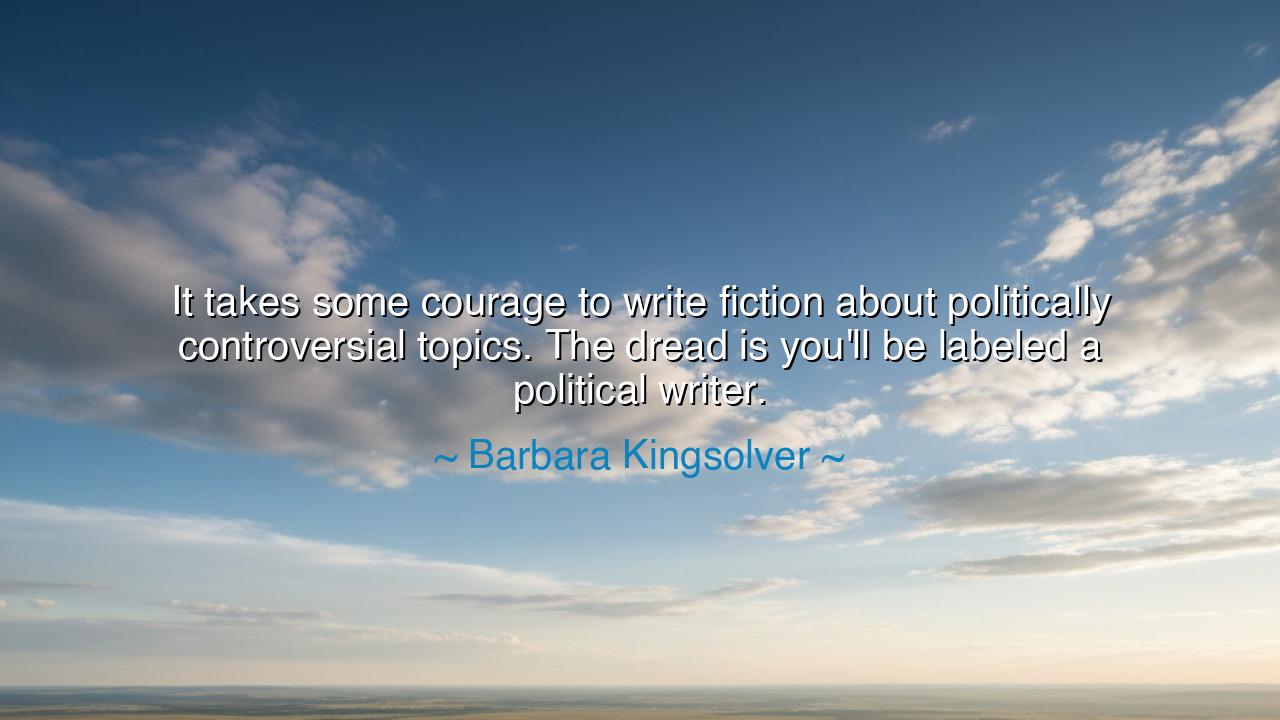
It takes some courage to write fiction about politically
It takes some courage to write fiction about politically controversial topics. The dread is you'll be labeled a political writer.






“It takes some courage to write fiction about politically controversial topics. The dread is you'll be labeled a political writer.” — Thus spoke Barbara Kingsolver, the acclaimed novelist whose words pulse with both grace and rebellion. In this reflection, she unveils the quiet burden of the artist — the one who dares to speak truth in a world that prefers silence. Her confession is not of fear, but of honesty. For to write about controversial topics is not merely to wield a pen; it is to challenge power, awaken conscience, and risk misunderstanding. And yet, as Kingsolver implies, this is the sacred duty of the storyteller: to reveal what others hide, even when the world seeks to chain them with labels.
Kingsolver’s words arise from her own experience as a writer whose fiction often treads the perilous boundary between art and activism. From The Poisonwood Bible to Flight Behavior, her novels have dared to confront issues of politics, morality, and the environment, always through the lens of human emotion. But she knows too well the cost of such bravery. In an age where neutrality is prized and discomfort avoided, to speak of politics — even through story — is to risk being dismissed, simplified, or branded. Yet she insists that silence, too, is a form of politics. To say nothing is to allow the powerful to speak unopposed. And so she writes — with courage, with compassion, and with the quiet understanding that truth often comes wrapped in controversy.
The ancients, too, knew the danger of speaking truth through art. Consider Sophocles, whose tragedy Antigone dared to question the laws of the state in favor of the laws of conscience. His heroine defies the king’s decree to honor her brother with burial, declaring that moral duty stands above political command. The play, though clothed in myth, was a mirror to the city’s soul — a challenge to tyranny. Like Kingsolver, Sophocles understood that fiction, when honest, does not merely entertain; it provokes. It reveals the unspoken, it tears the veil from false order, and it asks the audience to confront themselves. For this reason, art that speaks truth has always been both loved and feared.
Kingsolver’s lament — “the dread is you’ll be labeled a political writer” — reveals another dimension of her wisdom: the fear of being confined by others’ perception. To be labeled is to be reduced, to be stripped of one’s complexity and bound to a single idea. The artist, like the philosopher, seeks freedom — the freedom to explore all shades of human experience, not to be confined to the narrow walls of ideology. Yet the world is quick to categorize what it cannot control. A writer who touches upon war becomes “political.” A painter who shows injustice becomes “activist.” In truth, these labels are the armor of the comfortable — the means by which society avoids listening to what it does not wish to hear.
Yet Kingsolver’s courage lies precisely in her refusal to be silenced by such fear. She reminds us that courage is not the absence of dread, but the willingness to move through it. Every artist who has ever spoken with conviction has faced this same struggle. George Orwell, in writing Animal Farm and 1984, risked the scorn of both the political left and right; yet his words endure as eternal warnings against oppression. Harriet Beecher Stowe, whose novel Uncle Tom’s Cabin helped ignite the moral conscience of a nation, was dismissed by some as sentimental and by others as dangerous — yet her story helped move hearts toward justice. These writers, like Kingsolver, knew that to write truthfully is to walk a narrow bridge between beauty and rebellion.
In truth, fiction and politics are never fully separate. Every story, no matter how small, carries a vision of the world — a sense of what is right, what is wrong, and what it means to be human. Even the act of choosing which stories to tell is political, for it decides whose voices are heard and whose are silenced. Thus, Kingsolver’s courage is not only the courage to write, but to care — to believe that words can still shape the destiny of humankind. Her dread of being labeled is a sign of humility, but her persistence despite it is the mark of faith: faith in the transformative power of art to change both hearts and histories.
The lesson, then, is timeless: speak your truth, even if it trembles. Whether you are a writer, a thinker, or a dreamer, do not let the fear of labels silence your voice. The world will always seek to define you, to box your passion, to name your rebellion — but your duty is not to please the world; it is to awaken it. Be courageous in your craft. Tell the stories that ache to be told, especially those that burn with injustice or hope. For silence may keep you safe, but it will never make you whole.
So remember, my child: it is the courageous storyteller who moves the world. Speak with kindness, but also with boldness. Write, paint, sing, or act not for approval, but for truth. Let your art be a mirror to the age you live in — and when they call you a “political writer,” smile, for they have named you correctly. For as Barbara Kingsolver teaches us, the writer who fears no label is the one who keeps the fire of truth alive — and through that flame, lights the path for all who follow.






AAdministratorAdministrator
Welcome, honored guests. Please leave a comment, we will respond soon